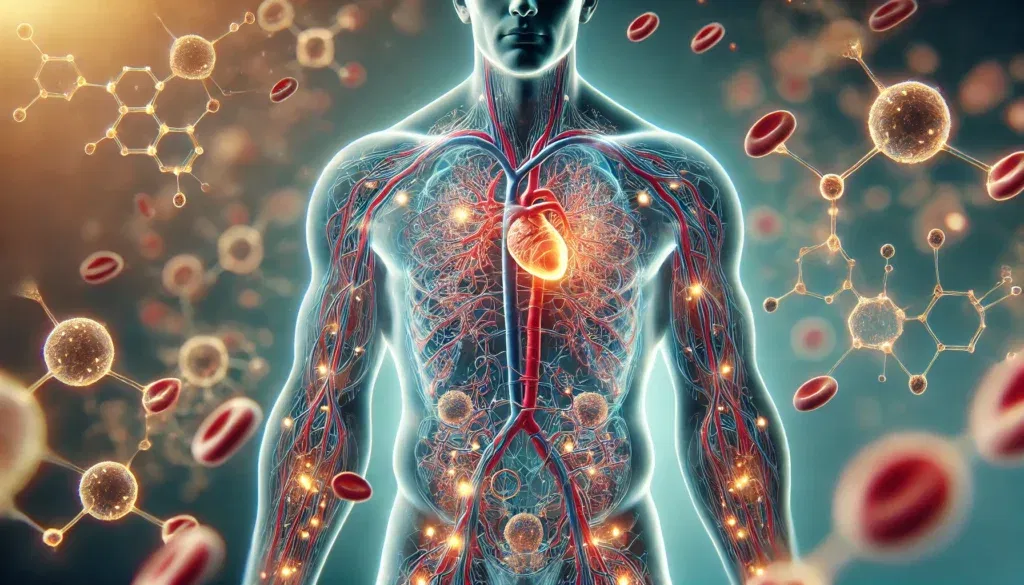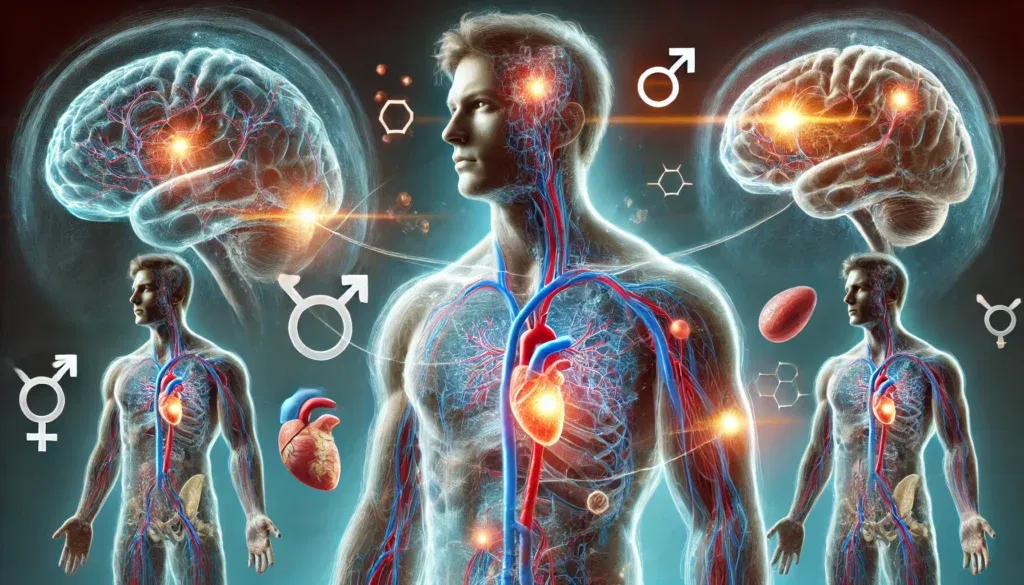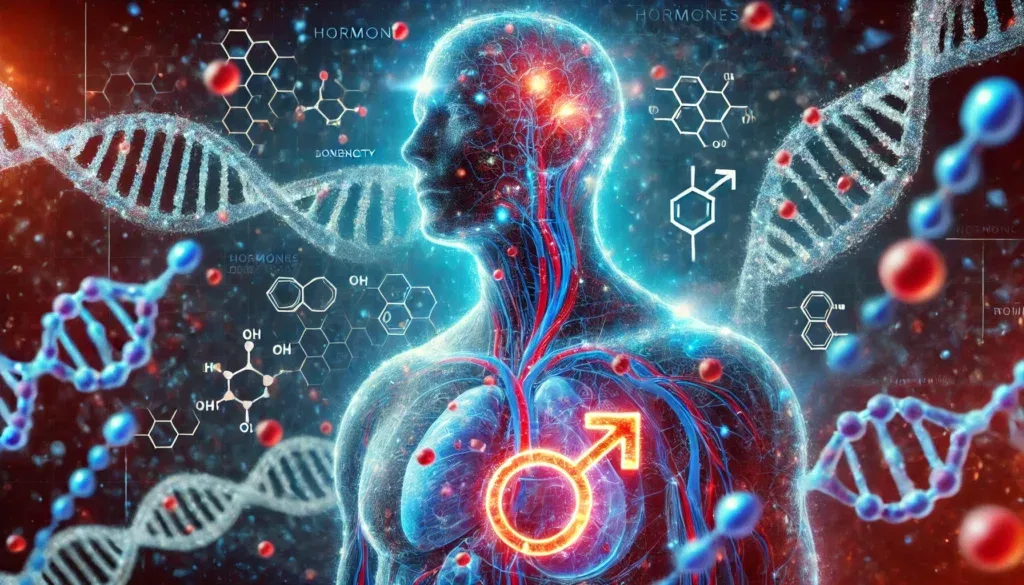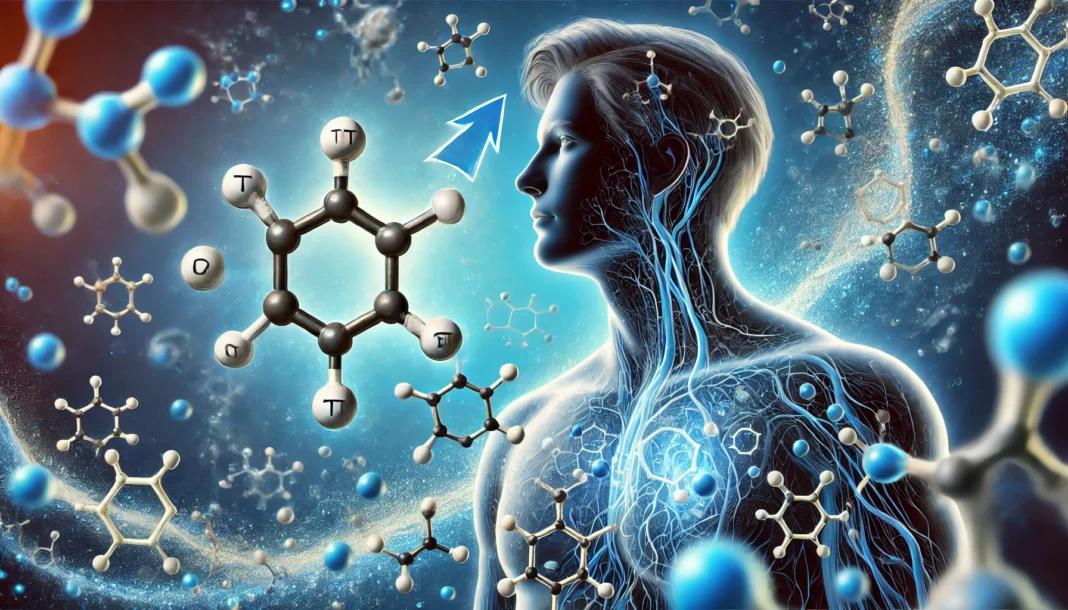Hormones play an indispensable role in regulating nearly every function within the male body. Acting as chemical messengers, these potent molecules influence processes ranging from metabolism and mood to muscle growth and sexual function. Understanding how hormones act as chemical messengers offers deep insight into their critical role in sustaining men’s health and promoting longevity. A well-balanced hormonal system ensures optimal energy levels, cognitive sharpness, cardiovascular health, and overall vitality. Conversely, imbalances in hormone production can lead to fatigue, weight gain, mood disturbances, and a heightened risk of chronic disease. As men age, fluctuations in hormone levels become increasingly significant, making it essential to recognize their impact and implement strategies for maintaining hormonal equilibrium.
You may also like: How to Get Your Testosterone Levels Checked: Best At-Home and Lab Testing Options
The Nature of Hormones: What Do Hormones Look Like?
At a molecular level, hormones exhibit diverse structures that determine their function and mode of action. Some, like peptide hormones, are composed of chains of amino acids, while others, such as steroid hormones, are derived from cholesterol. The chemical composition of a hormone dictates its solubility, half-life, and receptor interactions within the body. For instance, testosterone—a vital male hormone—belongs to the steroid hormone class and can easily cross cell membranes to bind with intracellular receptors. Meanwhile, insulin, a peptide hormone, requires membrane-bound receptors to exert its metabolic effects. The question “what do hormones look like?” extends beyond molecular diagrams, as their structural differences govern their ability to regulate physiological processes effectively.

How Hormones Act as Chemical Messengers
Hormones act as chemical messengers by transmitting signals between cells, organs, and systems to maintain homeostasis. The endocrine system, composed of glands such as the testes, adrenal glands, and pituitary gland, produces and secretes these hormones into the bloodstream. Once released, hormones travel to target tissues where they bind to specific receptors, triggering biochemical reactions that influence bodily functions. For example, when testosterone binds to androgen receptors in muscle cells, it stimulates protein synthesis, leading to muscle growth. Likewise, cortisol, the body’s primary stress hormone, acts on multiple organs to regulate metabolism and immune response. These interactions illustrate how hormones act as chemical messengers, ensuring that physiological processes remain balanced.
The Importance of Hormonal Balance in Men’s Health
A well-regulated endocrine system is crucial for sustaining men’s health. Hormonal imbalances, whether due to aging, lifestyle choices, or medical conditions, can significantly impact well-being. Testosterone, the primary male sex hormone, plays a key role in maintaining muscle mass, libido, bone density, and red blood cell production. However, declining levels of testosterone, commonly seen in aging men, can lead to fatigue, decreased motivation, and reduced physical performance. Similarly, imbalances in thyroid hormones can lead to metabolic dysfunction, affecting weight and energy levels. Understanding how hormones act as chemical messengers allows men to recognize signs of imbalance early and take proactive steps to restore optimal levels.
Levels of Hormones: How They Fluctuate and Affect Health
Hormone levels fluctuate throughout life due to a variety of factors, including age, stress, diet, and environmental exposures. In men, testosterone levels peak in early adulthood and gradually decline with age. This natural decrease can be exacerbated by factors such as poor sleep, chronic stress, and unhealthy eating habits. Similarly, cortisol levels tend to rise in response to prolonged stress, potentially leading to adrenal fatigue and immune suppression. The thyroid gland also plays a crucial role in regulating metabolism, with imbalances in thyroid hormones causing symptoms such as weight gain, depression, and fatigue. Monitoring levels of hormones through regular health assessments can help identify imbalances early, allowing for timely intervention and lifestyle modifications.
Supporting Hormone Production Through Lifestyle and Nutrition
Maintaining optimal hormone production requires a multifaceted approach that includes proper nutrition, physical activity, and stress management. Essential nutrients such as zinc, magnesium, and vitamin D play a direct role in hormone synthesis, particularly in the production of testosterone. Regular resistance training has been shown to enhance testosterone levels, while cardiovascular exercise supports overall endocrine function. Additionally, managing stress through meditation, deep breathing, and adequate sleep can prevent excessive cortisol production, which can otherwise disrupt hormonal balance. By understanding how hormones act as chemical messengers, men can make informed choices to support their endocrine health and enhance longevity.

Frequently Asked Questions (FAQ) on Hormones and Men’s Health
1. What do hormones look like, and how do they function in the body?
Hormones are biochemical molecules that vary in shape and structure depending on their type. Some hormones are small peptides, while others are complex steroids. What do hormones look like under a microscope? Their appearance depends on their chemical composition—steroid hormones, for example, have a cholesterol-based ring structure, while peptide hormones resemble chains of amino acids. These structures determine how they interact with receptors in the body, ultimately influencing numerous physiological functions, from metabolism to mood regulation. Understanding what hormones look like on a molecular level helps scientists develop medications that can mimic or regulate their activity.
2. How do hormones act as blank messengers in the endocrine system?
Hormones act as blank messengers, meaning they deliver specific instructions to target organs and tissues. Unlike neurotransmitters, which work rapidly within the nervous system, hormones travel through the bloodstream to reach their destinations, sometimes taking minutes or even hours to exert their effects. This delayed response allows for long-term regulation of processes like growth, stress adaptation, and energy metabolism. The ability of hormones to act as blank messengers ensures that cells receive precise biochemical signals, maintaining homeostasis. Without this intricate communication system, the body would struggle to coordinate essential functions.
3. What factors influence the levels of hormones in men?
The levels of hormones in men fluctuate due to various factors, including age, diet, stress, and physical activity. Testosterone, the primary male sex hormone, naturally declines with age, leading to potential changes in muscle mass, energy levels, and libido. Chronic stress can elevate cortisol levels, which in turn may suppress testosterone production. Additionally, poor dietary choices and lack of sleep can disrupt hormone balance, further affecting overall health. Monitoring and maintaining optimal levels of hormones is crucial for long-term well-being and vitality.
4. How does hormone production change with age?
Hormone production undergoes significant changes as men age, particularly concerning testosterone and growth hormone levels. In early adulthood, hormone production is at its peak, supporting muscle growth, cognitive function, and reproductive health. However, around the age of 30, levels of hormones like testosterone begin to decline gradually. This decline can contribute to fatigue, reduced muscle mass, and decreased libido. Strategies such as strength training, balanced nutrition, and stress management can help support hormone production and mitigate the effects of aging.
5. What do hormones look like in diagnostic tests, and how are imbalances detected?
In medical diagnostics, hormones are typically measured using blood, saliva, or urine tests. What do hormones look like in lab reports? They are often represented as numerical values compared to standard reference ranges. If levels of hormones fall outside the normal range, it may indicate an underlying health condition such as hypogonadism, adrenal fatigue, or thyroid dysfunction. Advanced testing can also assess hormone metabolites, providing a more comprehensive picture of endocrine health. Regular hormone testing is recommended for men experiencing unexplained symptoms like fatigue, weight gain, or mood swings.
6. Can lifestyle modifications improve hormone production?
Yes, lifestyle modifications can significantly impact hormone production and balance. Regular exercise, especially resistance training, stimulates testosterone production, while a diet rich in healthy fats supports the synthesis of steroid hormones. Managing stress through meditation, deep breathing, or adequate sleep helps regulate cortisol, preventing it from interfering with other hormones. Avoiding excessive alcohol consumption and minimizing exposure to endocrine-disrupting chemicals found in plastics and personal care products can also support optimal hormone function. By making these adjustments, men can naturally enhance their levels of hormones and overall health.
7. What role do hormones play in muscle growth and recovery?
Hormones act as blank messengers that regulate muscle protein synthesis, repair, and growth. Testosterone and growth hormone are particularly crucial for muscle development, influencing how effectively the body builds and maintains lean mass. After intense exercise, levels of hormones like insulin and cortisol fluctuate, affecting muscle recovery and energy replenishment. Proper nutrition, including sufficient protein intake, aids in maximizing the benefits of these hormonal responses. By understanding how hormones contribute to muscle recovery, athletes and fitness enthusiasts can optimize their training and performance.
8. How do environmental factors affect hormone levels?
Environmental factors play a significant role in hormone balance, with endocrine-disrupting chemicals (EDCs) being a primary concern. Plastics, pesticides, and industrial pollutants contain substances that mimic or interfere with natural hormone production. For example, bisphenol A (BPA) found in plastic containers can disrupt testosterone levels, while phthalates in personal care products may impact reproductive health. To mitigate these risks, reducing exposure to synthetic chemicals and choosing organic, minimally processed foods can help maintain healthy levels of hormones. The cumulative impact of environmental toxins makes it essential to be mindful of everyday exposures.
9. What happens when levels of hormones become too high or too low?
Both excessive and deficient levels of hormones can lead to significant health concerns. High testosterone levels, for instance, may contribute to aggression and cardiovascular risks, while low levels can result in fatigue, depression, and reduced muscle mass. Elevated cortisol can cause chronic stress-related issues, whereas insufficient cortisol production may lead to adrenal fatigue. The key to optimal health is maintaining balanced levels of hormones through proper medical monitoring, lifestyle adjustments, and, when necessary, targeted hormone therapy. Regular check-ups and awareness of hormonal symptoms can prevent long-term complications.
10. How does stress impact hormone production?
Chronic stress profoundly affects hormone production, particularly by increasing cortisol levels. Elevated cortisol can suppress testosterone and growth hormone, leading to reduced muscle mass, increased fat storage, and decreased libido. Additionally, stress disrupts sleep patterns, which are essential for the natural regulation of levels of hormones involved in recovery and metabolism. Engaging in stress-reducing activities such as exercise, mindfulness, and adequate rest can help counteract these effects. Understanding the connection between stress and hormone production allows for better management of both physical and mental health.

Conclusion: The Role of Hormones in Men’s Health and Longevity
Hormones govern nearly every aspect of men’s health, from muscle growth and metabolism to mood stability and immune function. Their role as chemical messengers is fundamental in ensuring the body operates smoothly, making it essential to maintain hormonal balance through proactive lifestyle choices. As men age, monitoring hormone levels and making informed dietary and fitness decisions can mitigate the effects of declining testosterone, rising cortisol, and other endocrine shifts. Recognizing the importance of hormone production and how levels of hormones fluctuate over time empowers men to take control of their health and longevity. By fostering a deeper understanding of these biochemical regulators, individuals can optimize their vitality, energy, and overall well-being for years to come.
men’s hormonal health, testosterone and aging, endocrine system function, natural hormone boosters, male longevity tips, testosterone optimization, hormonal balance for men, metabolism and hormones, stress and cortisol regulation, thyroid health in men, hormone-friendly nutrition, fitness and hormone production, bioidentical hormone therapy, men’s wellness strategies, lifestyle changes for hormonal health, adrenal health and longevity, sleep and testosterone levels, healthy aging for men, optimizing testosterone naturally, endocrine disruptors and men’s health
Further Reading:
Overview of the Endocrine System
Disclaimer: The information provided in this article is for general informational purposes only. The content does not constitute professional advice of any kind, including but not limited to medical, legal, or financial advice. HisHealthMag and its contributors make no representations or warranties regarding the accuracy, completeness, or reliability of the information presented. Always seek the advice of a qualified professional for any specific concerns or questions you may have. Neither HisHealthMag nor its authors assume any responsibility or liability for any actions taken based on the information provided in this article. The views and opinions expressed are those of the author(s) and do not necessarily reflect the official policy or position of HisHealthMag.





